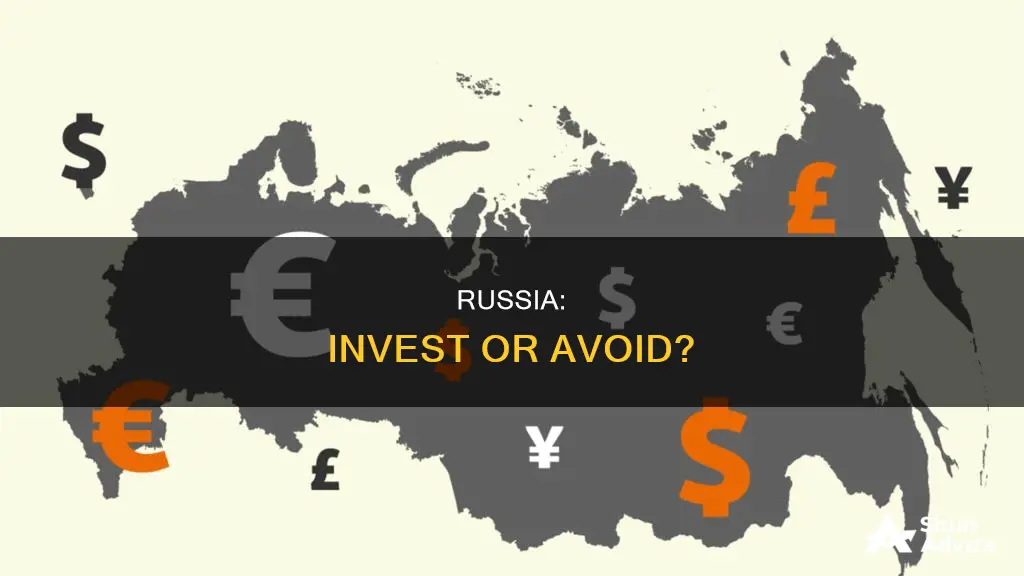
Investing in Russia is a challenging prospect for many, with the country's reputation for corruption and a lack of transparency presenting significant barriers to business. The country's heavy-handed government, culture of crony capitalism, and vulnerability to commodity price swings due to its dependence on oil are also off-putting to potential investors. However, Russia's enormous natural wealth in oil, gas, minerals, and human resources, as well as its booming digital economy, make it an attractive prospect for those seeking high returns.
Since the collapse of the USSR, Russia has been a country full of opportunities, with the government introducing new initiatives each year to encourage foreign investors. Russia has jumped from 120th to 31st place in the World Bank's annual ranking of countries' ease of doing business, and the country offers many incentives to invest, including Special Economic Zones (SEZs) and Advanced Development Territories (ADTs).
| Characteristics | Values |
|---|---|
| Ease of investment | Difficult for outsiders to understand; not easy to invest directly in the Russian stock market |
| Access for foreign investors | Access through mutual funds, exchange-traded funds (ETFs), and American depositary receipts (ADRs) |
| Natural resources | Oil, gas, minerals, diamonds, gold |
| Economy | 8th largest in the world in 2022, with a GDP of $2.24 trillion; per capita GDP of $15,345.10 in 2022 |
| Corruption | Ranked 137th out of 180 nations on the 2022 Corruption Perceptions Index |
| Investment opportunities | Special Economic Zones (SEZs), Advanced Development Territories (ADTs), booming digital economy, friendly environment for foreign businesses |
| Sanctions | Economic sanctions imposed by many countries, including the US, UK, EU, and Canada, have impacted Russia's economy |
What You'll Learn
- Investing in Russia's stock market is challenging, but possible through mutual funds, ETFs, and ADRs
- Russia's natural resources include oil, gas, minerals, and diamonds
- Corruption and a lack of transparency are barriers to business in Russia
- Economic sanctions have impacted Russia's economy and ability to access global funds
- Russia's tech industry is booming, with the country being a top producer of STEM graduates

Investing in Russia's stock market is challenging, but possible through mutual funds, ETFs, and ADRs
Investing in Russia's stock market is not easy, but it is possible. The Russian economy is characterised by a heavy reliance on natural resources, increasing isolation from Western countries, and a small social safety net. Oil, natural gas, and aluminium are key exports. As of 2022, Russia was among the top 10 economies in terms of Gross Domestic Product (GDP).
Many US-based mutual funds and ETFs have ceased operating in Russia due to the invasion of Ukraine, and several funds are unable to deal in Russian securities. However, investors can still gain exposure to the Russian market through mutual funds, exchange-traded funds (ETFs), and American depositary receipts (ADRs). These investment vehicles provide access to a wide range of asset classes in Russia, including equities, fixed income, commodities, and alternatives. Equities are the most common asset class.
ETFs are a low-cost way to invest in Russian stocks by tracking broad market indices. However, due to sanctions, ETFs that track indices on Russia are no longer tradable, and Russian shares have been removed from emerging market indices by major index providers.
Mutual funds and ETFs cover a wide range of stocks across all sectors of the Russian market, as well as market caps and share classes. These funds can be indexed or actively managed.
It is important to note that investing in Russia comes with significant risks. The country is known for its high levels of corruption and a lack of transparency, which pose barriers to business. The economy's heavy reliance on oil and other commodities makes it vulnerable to price swings and economic sanctions. The invasion of Ukraine has led to extensive sanctions and a deterioration in Russia's economic outlook.
Therefore, investing in Russia is suitable for aggressive investors with a higher risk appetite who are willing to navigate the challenges and uncertainties of the Russian market.
Metals: A Safe Investment Haven?
You may want to see also

Russia's natural resources include oil, gas, minerals, and diamonds
Russia is likely the richest country in the world in terms of natural resources. It has abundant supplies of oil, natural gas, timber, and valuable minerals such as copper, diamonds, lead, zinc, bauxite, nickel, tin, mercury, gold, and silver. Most of these resources are located in Siberia and the Far East. Russia's natural resources account for 95.7% of its national wealth.
Russia has large deposits of fuel and energy resources, including oil, natural gas, coal, and uranium ore. It is ranked first in the world in gas reserves, with 32% of the world's reserves and 30% of world production. It is the second-largest producer of oil, with a 10% share of world production, and has the third-largest coal reserves. Russia also has the world's largest proved natural gas reserves, at 1.32 quadrillion cubic feet, accounting for nearly 20% of the global total as of 2020.
In addition to its fuel and energy resources, Russia has extensive mineral deposits. It has the largest iron ore deposits in the world and is ranked second in tin and third in lead. It also has rich reserves of manganese, chromium, nickel, platinum, titanium, copper, tin, lead, tungsten, diamonds, phosphates, and gold. The Kursk Magnetic Anomaly in southwestern Russia is believed to contain one-sixth of the world's total iron ore reserves. Russia is also a leading producer of industrial diamonds, accounting for 37% of global production and 46% of the world's reserves in 2022.
The abundance of natural resources in Russia has made the country virtually self-sufficient in energy and a large-scale exporter of fuels. Oil and gas are major hard-currency earners for the country, with Europe being the primary market for these exports. Russia's natural resources also include timber, with the forests of Siberia containing an estimated one-fifth of the world's supply.
Investing Globally: Picking the Right Countries
You may want to see also

Corruption and a lack of transparency are barriers to business in Russia
Corruption is a significant problem in Russia, impacting all areas of life, including the economy, business, public administration, law enforcement, healthcare, and education. Transparency International, a worldwide corruption watchdog, scored Russia 26 out of 100 in its 2023 Corruption Perceptions Index, ranking it 141st out of 180 countries. This is Russia's lowest score yet, and it indicates a high level of corruption.
Corruption in Russia is endemic and is often referred to as "kleptocracy", "oligarchy", or "plutocracy" due to its crony capitalist economic system. It is deeply rooted in the historical model of public governance and is attributed to the general weakness of the rule of law in the country. The rise of Russia and the dissolution of the Soviet Union coincided with the illegal transfer of billions of dollars from the Soviet state treasury into private accounts across Europe and the U.S. by elites. This highlights the normalization of corruption and the involvement of high-level government officials.
The average bribe amount in Russia has increased significantly over the years, and bribery is now considered a necessary cost of doing business. Businesses, especially foreign investors, face significant barriers due to the prevalence of corruption. According to surveys, 78% of businesses in Russia reported having to pay bribes, and 71% considered corruption the biggest obstacle to foreign investment. The magnitude and scope of corruption in Russia today are unprecedented, and it is not viewed as a virus infecting the system but rather as the system itself.
The Russian government has been criticized for not doing enough to combat corruption effectively. While there have been some modest anti-corruption measures implemented, such as increasing salaries for law enforcement and toughening penalties for certain crimes, the problem persists and is a barrier to business and investment in Russia. The lack of transparency and the dysfunctional rule of law enable widespread corruption, making it challenging for businesses to navigate the complex and often deliberately complicated legislation and regulations.
Invest in Yourself: Your Greatest Asset
You may want to see also

Economic sanctions have impacted Russia's economy and ability to access global funds
Economic sanctions have significantly impacted Russia's economy and its ability to access global funds. In response to Russia's invasion of Ukraine, the United States, the European Union, the United Kingdom, Japan, and other allies have imposed extensive sanctions on Russia, targeting its financial system, key industries, and individuals. These sanctions have restricted Russia's access to global financial markets and limited its ability to trade and do business internationally.
One of the most significant effects of the sanctions has been the immobilization of approximately $300 billion worth of Russian Central Bank assets, hindering the central bank's ability to support the war effort and mitigate the impact of sanctions. Additionally, sanctions have been placed on Russia's largest financial institutions, restricting dealings with banks that represent a substantial portion of the Russian banking sector's assets. As a result, Russia's economy is expected to contract by over 3% in 2023, according to the IMF.
The sanctions have also targeted Russia's ability to import and export goods and services. Exports of certain products from Russia, such as fossil fuels, minerals, and agricultural products, have been banned or restricted, leading to a significant decline in Russia's trade and revenues. For example, sanctions on oil imports that came into force in December 2022 caused a drop of over 40% in Russia's oil revenues in February 2023 compared to the previous year.
Furthermore, the sanctions have disrupted Russia's supply chains and access to advanced technology. Russia is facing shortages of foreign-origin components, including semiconductors, which are crucial for its military and aviation industries. As a result, Russia has been forced to turn to less technologically advanced countries, such as Iran and North Korea, to meet its supply needs.
The impact of these sanctions extends beyond Russia's economy. Due to the sanctions, foreign investors in Russia have faced challenges, and the risk associated with investing in the country has increased significantly. Mutual funds, exchange-traded funds (ETFs), and American depositary receipts (ADRs) that provide exposure to Russia may be impacted by the sanctions, and investors' ability to actively invest in Russian stocks has become limited.
Invest in Coca-Cola: A Global Icon
You may want to see also

Russia's tech industry is booming, with the country being a top producer of STEM graduates
Investing in Russia is a complex endeavour, especially in the current economic climate. The country's invasion of Ukraine has resulted in economic sanctions from many countries, causing Russia's economy to drop. However, Russia's tech industry is experiencing growth, and the country is a top producer of STEM graduates, which could make it an attractive investment prospect.
Russia's tech industry is facing a challenging period due to the impact of Western sanctions and the departure of many prominent technology companies. Companies such as Apple, Microsoft, Google, and Facebook have ceased or limited their operations in the country, and there are restrictions on Russia's access to critical high-tech goods, including semiconductors. These developments have disrupted the Russian tech sector and limited the availability of technology for Russian citizens.
Despite these challenges, Russia's tech industry has been booming, and the country is a significant producer of STEM graduates. Russia has a strong educational tradition in mathematics and the sciences, with a 99.7% literacy rate and one of the highest rates of tertiary education attainment among OECD countries. This focus on education has resulted in a high proportion of STEM graduates, with Russia consistently ranked among the top countries in this regard.
The high output of STEM graduates in Russia is a significant advantage for its tech industry. STEM graduates are highly sought after globally and are essential for driving technological innovation and economic growth. With a large pool of talented workers, Russia has the potential to make technological breakthroughs in fields like artificial intelligence, biotechnology, and advanced materials. This could make the country an attractive investment destination, particularly for those seeking to invest in emerging technologies.
However, it is important to note that investing in Russia comes with certain risks and challenges. The country's heavy-handed government, culture of crony capitalism, and high levels of corruption present significant barriers to business. Additionally, Russia's economy is heavily dependent on oil and other natural resources, making it vulnerable to commodity price swings and economic sanctions.
In conclusion, while Russia's tech industry is facing challenges due to sanctions and the departure of tech companies, the country's strong production of STEM graduates and focus on education could make it an attractive investment prospect for those seeking opportunities in emerging technologies. However, investors should carefully consider the risks and challenges presented by Russia's economic and political environment before making any investment decisions.
Encouraging Factors for New Industry Investment
You may want to see also
Frequently asked questions
The Russian government has introduced several incentives to encourage foreign investors, including Special Economic Zones (SEZs) and Advanced Development Territories (ADTs). The country has also been developing its digital economy and has a booming tech industry.
Russia has a reputation for corruption and a lack of transparency. Its economy is vulnerable to commodity price swings due to its dependence on oil and gas. The war in Ukraine has also led to economic sanctions from many countries, restricting access to global funds.
Russia has a highly educated workforce, with a 99.7% literacy rate and a high rate of tertiary education attainment. The country also has abundant natural resources, including oil, gas, minerals, and diamonds. Russia has been working to improve its business environment, rising from 120th to 31st place in the World Bank's ranking of countries easiest to do business in.







